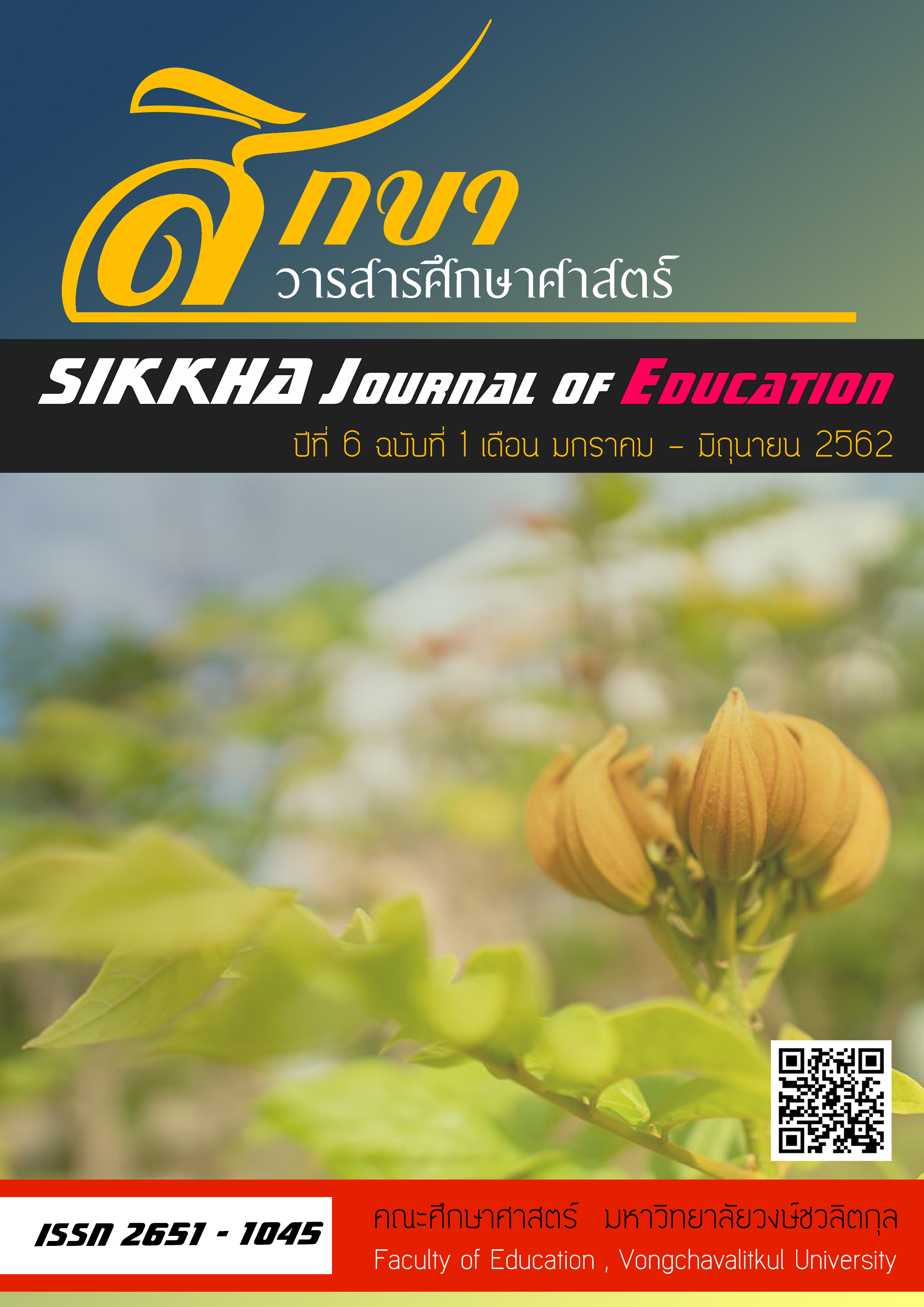การจัดการเรียนรู้เพื่อเสริมสร้างกระบวนการทางความคิดเพื่อการเติบโต
คำสำคัญ:
กระบวนการทางความคิดเพื่อการเติบโต, การจัดการเรียนรู้, การพัฒนาผู้เรียนบทคัดย่อ
Growth Mindset หรือกระบวนการทางความคิดเพื่อการเติบโต คือ การมีความเชื่อว่าตนเองสามารถเรียนรู้และพัฒนาศักยภาพได้อย่างต่อเนื่องด้วยความมุ่งมั่นและพยายาม การจัดการเรียนรู้เพื่อเตรียมผู้เรียนไปสู่สังคมในอนาคต มุ่งเน้นการพัฒนาผู้เรียนให้มี Growth Mindset เพื่อนำไปสู่การเป็นบุคคลแห่งการเรียนรู้ ผู้เรียนที่มี Growth Mindset จะมีคุณลักษณะกระตือรือร้นและแสวงหา สิ่งใหม่ที่ดีกว่าเดิมอย่างต่อเนื่อง ผู้สอนยังต้องมีความคิดความเชื่อที่มีต่อผู้เรียนในทิศทางที่ถูกต้อง 4 ประการ ได้แก่ 1) เชื่อว่าผู้เรียนทุกคนมีคุณค่าและควรได้รับการยกย่อง 2) ผู้เรียนทุกคนสามารถเรียนรู้ ได้ด้วยกระบวนการเรียนรู้ที่มีความแตกต่างกัน 3) ผู้เรียนทุกคนสามารถเรียนรู้ประสบความสำเร็จได้ และ 4) ผู้เรียนทุกคนมีศักยภาพในการพัฒนาตนเองไปสู่ความสำเร็จ การจัดการเรียนรู้ที่สามารถเสริมสร้างให้ผู้เรียนมี Growth Mindset จะทำให้ผู้เรียนมีความมุ่งมั่นและความพยายามในการเรียนรู้ ใช้กระบวนการเรียนรู้ของตนเอง ผู้สอนส่งเสริมผู้เรียนให้มี Growth Mindset ด้วยการเป็นนั่งร้านทางการเรียนรู้ (Scaffold) การใช้พลังคำถาม (Power Questions) การชี้แนะเพื่อการรู้คิด (Cognitive Guided) และการสะท้อนคิดตนเอง (Self-reflection)
เอกสารอ้างอิง
Alerson, L. (2017). Growth Mindset: The Door to Achieving More. Retrieved September 20, 2018 from
https://www.free-ebooks.net/ebook/Growth-Mindset-The-Door-to-Achieving-More/pdf?dl&preview
Anderson, M. (2016). Learning to Choose Choosing to Learn: The Key to Student Motivate & Achievement. Alexandria,
VA: ASCD.
Benee, P., and Wilkins, B. (2014). Efficacy of a Growth Mindset Intervention to Increase Student Achievement
(Doctoral Dissertation). Gardner-Webb University, USA.
Blackburn, B. (2015). Motivating Struggling Learners: 10 Ways to Build Student Success. New York: Routledge.
Blackwell, S., Trzesniewski, H., and Dweck, C. (2007). Implicit theories of intelligence predict achievement across an
adolescent transition: A longitudinal study and an intervention. Child Development, 78(1), 246 – 263.
Brock, Annie and Hundley, H. (2016). The Growth Mindset Coach: A Teacher’s Month – by – Month Handbook for
Empowering Students to Achieve. Berkeley, CA: Ulysses Press.
Clark, A. and Sousa. (2018). How to be a Happy Academic. Thousand Oaks, CA: SAGE Publications Inc.
Cottrell, S. (2018). Mindfulness for Students. London: Palgrave.
C.M. Callahan, & E.J. Gubbins (Eds.), Malleable Minds: Translating Insight from Psychology and Neuroscience to Gifted
Education (pp.7 – 18). University of Connecticut: Storrs, CT
Dockterman, D. and Blackwell, L. (2014). Growth Mindset in Context Content and Culture Matter Too. Retrieved
September 20, 2018 from www.leadered.com/pdf/GrowthMindset.pdf
Duckworth, S. (2016). Sketchnotes for Educators: 100 Inspiring Illustrations for Life Long Learners. Irvine, CA:
EdTechTeam Press.
Dweck, C. (2006). Mindset: The New Psychology of Success: How We Can Learn to Fulfill our Potential. New York:
Ballantine.
Dweck, C. (2008). Mindset. New York: Ballantine Books.
Dweck, C. (2009). Who will the 21stCentury Learners be?. Knowledge Quest, 38(2), 8 – 9.
Dweck, C. (2012). Mindset: How You Can Fulfill Your Potential. London: Robinson.
Dweck, C. (2012). Mindset and Malleable Minds: Implications for Giftedness and Talent. In R.F. Subotnik, A. Robinson.
Dweck, C., Walton, G. and Cohen, G. (2014). Academic Tenacity: Mindset and Skills that Promote Long – Term
Learning. Seattle, WA: Bill & Melinda Gates Foundation.
Education Week Research Center. (2016). Mindset in the Classroom: A National Study of K-12 Teachers. Bethesda, MD:
Editorial Projects in Education Inc.
Flores, D., Lemons, A. and McTernan, H. (2011). The Correlation between Student Growth Mindset and Conceptual
Development in Physics. Retrieved September 27, 2018 from modeling.asu.edu/modeling/Mindset&Physics-
McT,L,F.pdf
Fogarty, R. (2016). Invite Excite Ignite: 13 Principles for Teaching, Learning, and Leading, K – 12. New York, NY:
Teachers College Press.
Gawron, H. (2018). Just Ask Us: Kids Speak Out on Student – Engagement. Thousand Oaks, CA: A SAGE Company.
Good, C., Anderson, J. and Inzlicht, M. (2003). Improving Adolescents’ Standardized Test Performance: An Intervention
to Reduce the Effect of Stereotype Threat. Journal of Applied Development Psychology,24 (6),645 – 662.
Goldberg, G. (2016). Mindset & Moves: Strategies that Help Readers Take Charge. Thousand Oaks, CA: Corwin.
Grant, H., and Dweck, C. (2003). Clarifying Achievement Goals and their Impact. Journal of Personality and Social
Psychology, 85(3), 541 – 553.
Gregory, G., and Kaufeldt, M. (2015). The Motivated Brain: Improving Student Attention, Engagement, and Perseverance. Alexandria, Virginia: ASCD.
Hanover Research. (2015). Strategies for Promoting Student Growth mindset. Arlington, VA: Hanover Research Corporate
Headquarters.
Hildrew, C. (2018). Becoming Mindset School: The Powerful of Mindset to Transform Teaching, Leadership and
Learning. New York, NY: Routledge.
Hoffer, W. (2016). Cultivating STEM Identities: Strengthening Student and Teacher Mindsets in Math and Science.
Portsmouth, NH: Heinemann.
Illinois Center for School Improvement. (2016). Habits of Mind – Developing a Growth Mindset. Retrieved September
20, 2018 from https://revivingschools.org/wp.../Learning-Snapshot-Developing-a-Growth-Mindset.pdf
Keene, E. (2018). Engaging Children: Igniting a Drive for Deeper Learning K – 8. Portsmouth, NH: Heinemann.
Marz, K. and Hertz, C. (2015). A Mindset for Learning: Teaching the Traits of Joyful, Independent Growth. Portsmouth
NH: Heinemann.
Mueller, C. and Dweck, C. (1998). Praise for intelligence can undermine children’s motivation and performance.
Journal of Personality and Social Psychology, 75(1), 33 – 52.
Ng, B. (2018). The Neuroscience of Growth Mindset and Intrinsic Motivation. Retrieved September 20, 2018 from
https://www.ncbi.nlm.nih.gov/pubmed/29373496.
Rienzo, C., Rolfe, H., and Wilkinson, D. (2015). Changing Mindsets: Evaluation Report and Executive Summary.
London: National Institute of Economic and Social Research.
Schroder, H., Moran, T., Donnellan, M. Moser, J. (2014). Mindset Induction Effects on Cognitive Control: A
Neurobehavioral Investigation. Retrieved September 20, 2018 from
https://www.ncbi.nlm.nih.gov/pubmed/25149141.
Silver, D. and Stafford, D. (2017). Teaching Kids to Thrive: Essential Skills for Success. Thousand Oaks, CA: A SAGE
Company.
Smith, M., and Firth, Jonathan. (2018). Psychology in the Classroom: A Teacher’s Guide to What Works. Oxon:
Routledge.
Stager, P. (2015). The Power of Growth Mindset. The Direct Support Workers Newsletter, 4(9), 1 – 7.
Truax, M. (2018). The Impact of Teacher Language and Growth Mindset Feedback on Writing Motivation. Literacy
Research & Instruction, 57(2), 135 – 157.
Weber, J. (2018). Growth Mindset Interventions: Lessons from Across Domains. Netherlands: University of Groningen.
Weiss, D. and Fortus, D. (2013). School, Teacher, Peers, and Parents’ Goals Emphases and Adolescents’ Motivation to
Learn Science in and out of School. Journal of Research in Science Teaching, 50(8), 952 – 988.
Yeager, D. and Dweck, C. (2012). Mindsets That Promote Resilience: When Students Believe That Personal
Characteristics Can Be Develop. Educational Psychologist, 47(4), 302 – 314.



